1.
Finighan: Is the United Nations all talk and no
action? The Security Council fails again in it’s attempts for a Ceasefire in
Syria and the Bombing of Aleppo continues. So who’s really calling the shots in
this complex Conflict? This is Inside Story.
2.
Finighan: Hello, welcome to the programme, I’m
Adrian Finighan. Russia has vetoed a UN Resolution to end the Bombing of Aleppo and
another Russian-sponsored Resolution also failed. The UN is warning that if airstrikes
continue on rebel-held Areas, Syria’s second largest City will be destroyed by
the end of the year. UN Ban Ki-Moon says that it’s worse than a slaughterhouse. In a moment we’ll look at what options remain for
Aleppo, but
first our Diplomatic Head Editor James Bays reports from New York on those UN
votes.
3.
Bays: Two votes on two separate rival Security
Council Resolutions. One proposing a grounding of all military aircraft flying
over Aleppo vetoed by Russia. The second watered-down version proposed by
Russia which only got four votes in favour. A day of high drama in the Security
Council, but also what must be seen as a day of shame that will do absolutely
nothing to help the People of Aleppo.
4.
Translator: Today we’re participating in one of
the strangest spectacles in the History of the Security Council voting on two
draft Resolutions of the Council, knowing that neither will be adopted.
5.
Bays: But many others blame that spectacle on the Russian ploy of
introducing a second Resolution at the last minute and vetoing the first Resolution
that would otherwise have passed.
6.
Rycroft: Normally I begin my statements in this
council with the words “Thank you, Mr. President.” I cannot do that today. Because today we
have seen the fifth veto in five years on Syria from you, Mr. President. A veto
that has once again stopped this Council from creating the unity
needed to give the People of Syria any hope for respite from their
suffering.
7.
Bays: The U.S. representative was also scathing
about the role of Russia.
8.
Pressman: Today was Time for the Council to act,
to learn the lessons of the recent Past. We failed to do that because one of us,
perversely the President of United Nations Security Council, is intent on
allowing the Killing to continue and indeed participating in carrying it out.
It is grotesque. [Samantha Power. Madeleine Albright. Daniel Patrick Moynihan.]
9.
Bays: There are few diplomatic options left. The
International Syria support Group, all the key international and regional
players got nowhere. Then there were efforts by the U.S. and Russia, they are
now not talking to each other. And the last-ditch option was trying to get the
Security Council to take a lead, they’ve now hit a roadblock.
There is one final initiative
led by Security Council Member New Zealand. Its ambassador Gerard van Bohemen
has his own draft text and he’s consulting with other countries about
one more attempt to get Agreement around the Security Council Table. James
Bays, Al Jazeera, at the United Nations.
10.
Finighan: Millions of Syrians have fled their Homes
during the five years of Fighting and there’s been a large exodus from Aleppo,
but the UN says there still could be two million People trapped in the City,
many afraid that their Homes will be taken by the regime if they leave. More
than 400 civilians, around 1/3 of them Children, have been killed in the last
two weeks alone. Hospitals have been continuously bombarded in Aleppo. There
are now only five which remain operational in the besieged part of the City.
We’ll bring in our guest in just a moment, but first I want to speak to Dr.
Meguerditch Terzian who is the President of Doctor’s Without Borders, Médecins
Sans Frontieres. Welcome to inside story, sir. What are you hearing
about conditions inside Aleppo right now?
11.
Terzian: Conditions are catastrophic according
to the 35 doctors remaining in the Town. They are telling simply bombs are
raining continuously on Aleppo since weeks and weeks. Wounded patients
everywhere. Eight hospitals only are capable to continue to function with big
difficulties.
12.
Finighan: That is quite a concern, isn’t it, the
fact that John Kerry has said that the Bombing of civilians in Aleppo could
amount to War-crimes, and medical Facilities appear to be being deliberately
targeted.
13.
Terzian: Yes, since the beginning of this Conflict
hospitals and the medical mission in general is systematically attacked and
honestly no one cares. So five years after, Aleppo unfortunately it’s not an
exception. The major problem are the 250,000 Population
that they are besieged in Aleppo and they are under Bombs since several weeks
now. It’s the same situation in other besieged Zones like rural Damascus, in Homes
as well. So the situation is very Bad as well in these besieged Areas, knowing
that there is 18 besieged Zones in Syria, majority of them under the opposition
Control.
14.
Finighan: Of course, Water supplies have been
directly targeted. There’s a limited availability of fresh Water, Food supplies
are dwindling, 400 People have died in the last couple of weeks alone, this is
a situation that is only going to get worse, isn’t it?
15.
Terzian: Yes, unfortunately People are very
pessimistic. They have difficulties to find Water, they have difficulties to
receive Electricity. If this situation will continue, clearly in the hospitals
in the coming weeks the situation will be catastrophic because they need Water
to Control the hygiene of the Hospital, they need Electricity to continue to
work in proper way, and if there is no basic conditions, it will be very
difficult for this population stuck in Aleppo town to reach the medical
facilities.
16.
Finighan: What would your message be to the
politicians at the United Nations who failed so abysmally at the weekend once
again to pass a Resolution to stop the violence in Aleppo?
17.
Terzian: Unfortunately all the Resolutions
failed again in this Conflict. We are not politicians, we are trying simply to
report what our colleagues are reporting from Aleppo, hoping that a miracle
will happen and the politicians finally will find a Solution.
18.
Finighan: Dr.
Terzian, many thanks indeed.
19.
Terzian: Thank you.
20.
Finighan: All right, so let’s bring in our
guests for today’s programme. Joining us from Moscow, Sergei Markov,
Director of the Institute for Political Studies and Public Spokesman
for President Putin. From Washington we’re joined by Hillary Mann []. And
from Abu
Dhabi we’re joined by Monzer Akbik,
spokesman of Tomorrow Movement, that’s a Syrian opposition Group. Welcome
to you all. Sergei Markov, we’ll start with you. We heard right at the
beginning of the programme, the US and British ambassadors criticising Russia’s
Veto at the UN Security Council. Has Russia abused its veto privilege here?
21. Markov: Of course that’s a [some Russian] without destroying of United Nations. But now we see a little bit irrational policy of Washington and London so we can believe it as that they can try and to crush United Nation, one of the major institute for whole international community. I think the main problem in Aleppo and Syria is United States in fact became the ally of Al-Qaeda named Jabhat al-Nusra. They tried to separate pro-American rebels in Syria from Jabhat al-Nusra as they cannot do it during the year. Probably there are no Possibility to make the division between al-Qaeda, Jabhat al-Nusra and pro-American Syrian rebels. I want to ask American officials and American soldiers: Do you agree that some crazy Washington politicians making your ally of Al-Qaeda, those Al-Qaeda which attacked Americans and killed thousands of American in New York on September 11?
22.
Finighan: Let’s bring in Hillary Mann Leverett
then in Washington. What do you make of what you’ve just heard there. I mean Russia calls its aerial activities of Aleppo
“Anti-Terrorist Strikes” and Russia’s Foreign Minister says he can’t see that
the US is seriously fighting militants from the Group that was formerly known
as al-Nusra and is suspicious of Washington’s calls for Russia and the Syrian
air force to cease their Bombing runs on Aleppo.
23.
Mann: You know the Russian position is an
interesting one and it has gained attraction, it has gained Power and dominance
as we see clearly on the military battlefield in Syria, but also politically
because it points, I think, objectively to an incoherence here in Washington
that even supporters of the Obama Administration, among Democrats especially,
see a real incoherence in this determination, this rhetorical determination to fight Terrorism
but then to try to pick out who’s a Good terrorist and who’s a Bad terrorist. It’s
something that is really, I think, riddling the presidential Campaign here and
putting People that otherwise would normally be diametrically opposed on
political issues, be they Foreign Policy or Domestic, on one side which points
to an incoherence in the current Administration’s policy on Syria.
24.
Finighan: Let’s bring in Monzer Akbik then in
Abu Dhabi. Russia’s Foreign Ministry said that the other Resolution, the one that it vetoed, the
Franco-Spanish one, distorts the real situation in Syria and that an
aerial ban would only provide cover to “terrorists”. What do you make of that?
25.
Akbik: Definitely this is not the War on Terror.
When you are Bombing indiscriminately a City, the eastern part of Aleppo where
there is about 300,000 People living, most of them women and Children, you’re Bombing
Hospitals, you’re Bombing Marketplaces and killing all these Children and
saying that I am fighting Terrorism. This is ridiculous. This is not a Fight
on Terrorism, this is a Fight on the People. This is War against the People
that Bashar al-Assad started five years ago because the People wanted Freedom
and Democracy and he is still continuing with this War. In east Aleppo there are
only 300, the number of the fighters from al-Nusra Front, which is classified
in United Nations Resolutions as terrorist Group, and there are 9,000 other fighters,
rebels that are not classified as terrorists. So
because we have 300 People we are wiping out the whole City and we are destroying
the whole City because of 300 fighters? This is not logical. In [Darayya?] for
example, West of Damascus, there was not one single fighter from al-Nusra and
the City of sieged by the Regime for about 3.5 years, and People were starved
until they got out completely of the City. So this was is
very clear, it’s a War on the People and it’s a War to keep Bashar al-Assad in Power
and al-Nusra is being used as just excuse and it’s used just to continue with
this rejection of the Ceasefire attempts that was tried by France and Spain.
26.
Finighan: You quoted some figures that Steffan de Mistura, the UN
Special Envoy to Syria told the Security Council, that it was the presence of
1,000 or so al-Nusra fighters that was being as a pretext for the Bombing of
275,000 People. Sergei Markov, Russia is helping to wage War against
the People, is it?
27.
Markov: Of course it’s pure propaganda. It’s
difficult [some Russian] to hear that our colleagues in Aleppo don’t want to
discuss real issues. And real issue, first of all, separation of clear
terrorist such as al-Qaeda Jabhat al-Nusra from pro-American rebels. And why
you don’t divide them? My colleague didn’t want to answer those question, but
now we have clear Answer. Because in fact, no difference between them, because
this is a so-called moderate jihadist and Jabhat al-Nusra. In fact, one army
and they fighting as one army. And second issue which we should discuss is the
Mistura plan. I think it’s a very Good plan. It can help to save tragic
humanitarian situation in Aleppo. Let’s allow those fighters to leave Aleppo
and to go [some Russian] under the Control of the United Nations without any Bombing
from the Syrian Government.
28.
Finighan: Sergei, as I said a few moments ago,
Russia calls its aerial activities over Aleppo “anti-terrorist strikes.” Just who is it
that Russia is targeting in Aleppo then, and how come so many innocent
civilians, Children, are being killed and injured by Russian strikes?
29.
Markov: I think the number of Children that have
been killed by Saudi Arabia- and United States-led Coalition, much more, much
more than from Russian strikes. It’s cruel War, sometimes civilians can
also be killed but main problem is not Russian activity which support more or less
civilised ophthalmologist, Bashar al-Assad. [Samantha Power. Madeleine
Albright.] The problem is that those who want to overthrow Bashar
al-Assad they are mostly jihadist and terrorists. Those who call for Freedom
and Democracy they usually don’t take [some Russian] and go to Fight in Aleppo
and in other Cities. Usually it’s sitting in Facebook in Paris or London or in Dacca.
The problem is, I can repeat, separate al-Qaeda. And please, United States,
don’t be Ally of al-Qaeda and we hope that [some Russian] now clearly will send
signal to own Government, “We don’t want to be an Ally of al-Qaeda.”
30.
Finighan: Hillary Mann Leverett, what do you
make of that? Why had US policy on Syria been such a failure?
31.
Mann: It was a strategic mistake to begin with.
We knew that invading
Iraq was a disaster. Invading Iraq not only lead to the deaths of
hundreds of thousands of People but it essentially, in a way, strategically
gave influence over Iraq to Iran. The military Intervention in Syria similarly was a disaster
strategically. It gave over Libya to Chaos and led to this enormous refugee
problem or contributed to it significantly. Similarly our Invasion of Afghanistan back in
2001 was a strategic disaster. So the decision here, very quickly, very just
off-the-cuff, to call for the Overthrow of the Syrian Government was something
that was reckless to begin with. I think increasingly People in Washington
understand that. They understand that there is not a military Victory to be had that
the United States could claim, which is why the United States keeps coming back
to the diplomatic process with Russia as much as People really hate it here in
Washington. They find it embarrassing, they find it a Perception of weakness of
the Obama Administration, they find it distasteful, but there is no other way
out of what otherwise will be an enormous strategic embarrassment for the
United States. There will continue to be, I think, these kind of Negociations. It’s important, I think, for all the actors
involved to spare the Lives of thousands of more Syrians, to get serious about
a negotiated settlement and not to be focused on whether a fighter is moderate
or not. It’s really an oxymoron to call a fighter “moderate” or terrorist “extreme.” They’re a fighter.
Fighters fight because they’re Good at Killing, not because they’re Good at Democracy.
32.
Finighan: All right. Monzer Akbik, what happens
next, do you think, in the run-up to Saturday’s vote, Germany’s Foreign
Minister said that the mounting Tension between the US and Russia had created a
situation that was more dangerous than the Cold War. France’s ambassador was, the
Foreign Minister actually, Jean-Marc Ayrault, said that the vote was a moment
of Truth for the Security Council. Is there any hope now, do you think of
finding a diplomatic Solution to Syria’s War, brokered by the UN?
33.
Akbik: Well, I have seen the Security Council Session
yesterday and the Sessions before that. It’s obvious that there is Confrontation,
serious diplomatic Confrontation between the West and Russia nowadays. There is
very strong statements from both sides against each other. Now the Western Group
is calling Russia or accusing Russia that doing Crimes against Humanity and War-crimes
in Syria by killing all these civilians with the Bombing, and nobody is really
buying that they are destroying all these Cities and killing all these People
just because they want to kill few hundreds of terrorists.
Now what next it
for us Syrians I would say that of course it was much better if the Resolution
to stop the Bombing and cessation of Hostilities in Aleppo and allowing
humanitarian Aid to enter Aleppo, if that was adopted, should have been much
better. But unfortunately it was not. What this means is that Aleppo will still be seiged, that the
People will still cannot have Food and Medicine, and many places they also
cannot have Water. This means that the Bombing will continue and the War will
continue and there will be more bloodshed, more suffering of the People. That’s
why of course, we are not seeing any light at the end of the tunnel on the
short term now, and of course we cannot foresee that there will be a World War
because of Aleppo. So what we are hoping for now at least that the
rebels should have something to defend themselves [for] the time being until
such a Ceasefire Agreement could be reached between the Superpowers.
34.
Finighan: Sergei, with Relations having
deteriorated as they have between Russia and the US, can you see them ever
coming together to work to bring Peace to Syria? Will they ever see eye-to-eye
on Syria again?
35.
Markov: Of course we very want to have a
compromise in Syria and peaceful moving there. But main [thing] that should be done,
United States should stop support Al-Qaeda. Now it’s very well much
clear. And civilians in Aleppo use as hostages by such a military coalition of al-Qaeda,
it’s mean Jabhat al-Nusra and pro-American rebels and fighters. We very much ask
our American partner to be more rational and to be more clear, and also to have
the policy which is supported by American People. We know very well that American People want United States to
be Russian Ally in fighting against al-Qaeda, in Syria and in other Areas to Fight
against international Terrorism. We very much [some Russian] by the fact that
Washington is a strong Contradiction with the political Will of American People,
now prepared to be military Ally of al-Qaeda against Russia in Syria. It
could be very dangerous Development but we very hope that Rationality and Democracy
will win in Washington.
36.
Finighan: Okay. Hillary, I just want to ask you about what
Sergei was saying then. How do the so-called moderate opposition Groups in
Aleppo separate themselves from the Group formally known as al-Nusra? That’s
one point I wanted you to take on there that Sergei was talking about. And also
about the Danger we were talking about here, this escalation, and Frank-Walter
Steinmeier’s comments that this is a situation that’s rapidly becoming more
dangerous than the Cold War.
37.
Mann: Absolutely. The issue of moderate fighters
versus terrorist fighters or extreme fighters is really farcical in a way. As I
said, there really is not a lot of difference. I don’t say that to say that the
Russian position is correct, I say that as a statement of fact. It’s almost
impossible to distinguish between these fighters and that’s why you see the
incoherence in US policy on this point. I don’t think the United States is
intentionally trying to stop a Ceasefire or to stop the Bloodshed in Syria,
it’s just an enormous policy problem of Washington’s own making, but it’s still
an enormous policy problem here that I think will only be resolved in a sense
by the next President. You could not
have a more stark choice before the American People between a President Clinton
and a President Trump. They are diametrically opposed in terms of how to work
with Russia.
I think the German Foreign Minister has put
his finger on a critically important issue for the World, which in part will be
decided by the presidential race here, which is the future of US-Russian Relations.
They have never been this bad, including during the Cold War. During
the Cold War the United States recognised Russian Interests in Syria and of
course in the former Soviet Space. Today the United States does not. And whether Russia is willing and capable of
confronting the United States on this issue could really be one of the most
momentous issues facing the World today. In
part, it will be decided by what the next President of the United States wants
to do vis-à-vis Russia. And over Syria.
38.
Finighan: And that, I’m afraid, is where we must
end our discussion. Many thanks indeed to you all, Sergei Markov in Moscow,
Hillary Mann Leverett in Washington, and in Abu Dhabi, Monzer Akbik. Thank
you as always for watching. Don’t forget you can see the programme and get it
anytime by going to aljazeera.com. For further discussion on this issue, join
us on our Facebook page at facebook.com/AJinside story. You can also join the
conversation on Twitter @AJinsidestory. From me, Adrian Finighan, and the whole
team, thanks for watching. We’ll see you again, bye for now.

















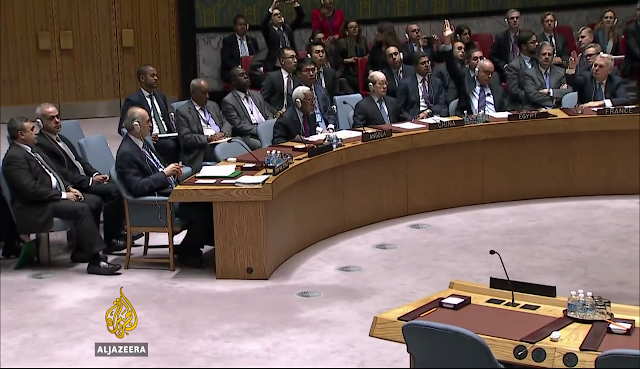










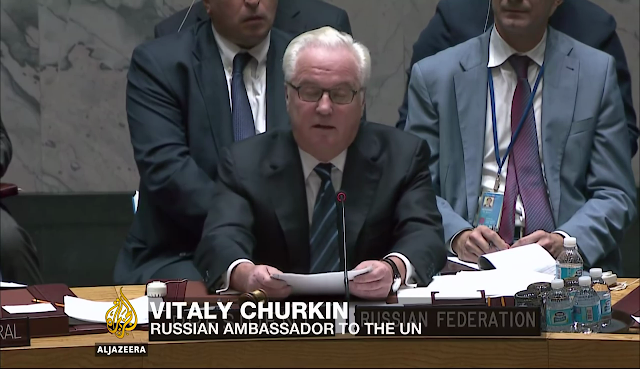











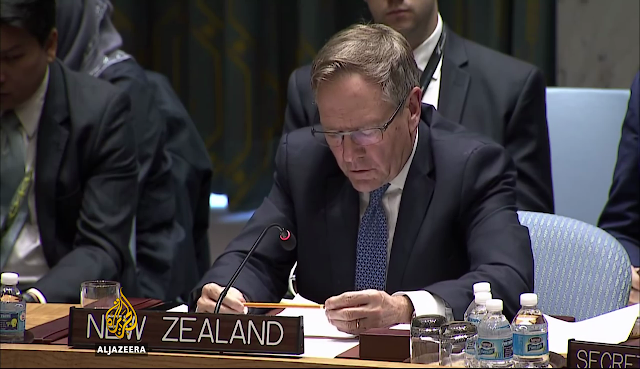






















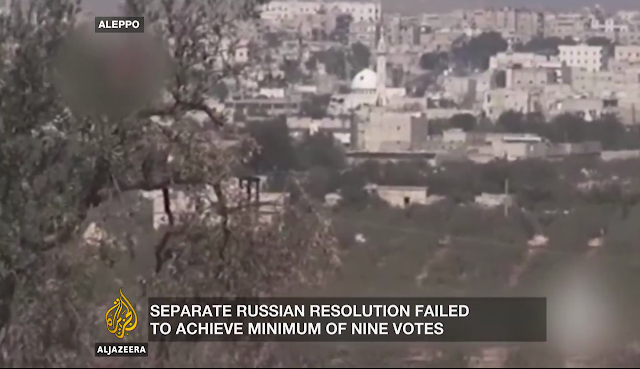

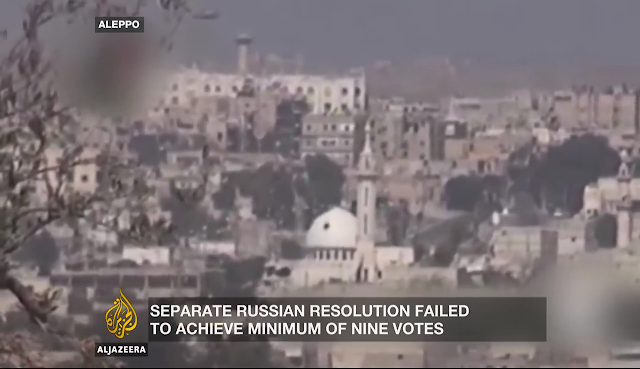

















































































No comments:
Post a Comment